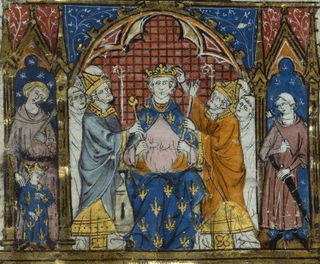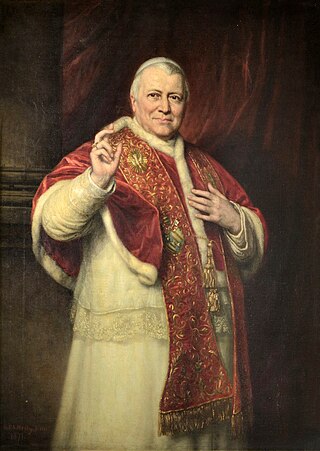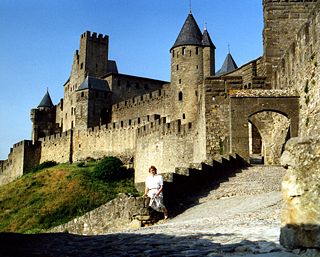
Pope John XXII, born Jacques Duèze, was head of the Catholic Church from 7 August 1316 to his death, in December 1334.

Year 1317 (MCCCXVII) was a common year starting on Saturday of the Julian calendar.

Year 1318 (MCCCXVIII) was a common year starting on Sunday of the Julian calendar.

Year 1324 (MCCCXXIV) was a leap year starting on Sunday of the Julian calendar.

The Franciscans are a group of related mendicant Christian religious orders within the Catholic Church. Founded in 1209 by the Italian saint Francis of Assisi, these orders include three independent orders for men, orders for nuns such as the Order of Saint Clare, and the Third Order of Saint Francis open to male and female members. They adhere to the teachings and spiritual disciplines of the founder and of his main associates and followers, such as Clare of Assisi, Anthony of Padua, and Elizabeth of Hungary. Several smaller Protestant Franciscan orders exist as well, notably in the Anglican and Lutheran traditions.
The Fraticelli or Spiritual Franciscans opposed changes to the rule of Saint Francis of Assisi, especially with regard to poverty, and regarded the wealth of the Church as scandalous, and that of individual churchmen as invalidating their status. The Fraticelli were declared heretical in 1296 by Boniface VIII.
Angelo da Clareno, also known as Angelo Clareno, was the founder and leader of one of the groups of Fraticelli in the early 14th century.
Michael of Cesena was an Italian Franciscan, Minister General of that order, and theologian. His advocacy of evangelical poverty brought him into conflict with Pope John XXII.

Ubertino of Casale was an Italian Franciscan and one of the leaders of the Spirituals, the stricter branch of the Franciscan order.
Apostolic poverty is a Christian doctrine professed in the thirteenth century by the newly formed religious orders, known as the mendicant orders, in direct response to calls for reform in the Roman Catholic Church. In this, these orders attempted to live their lives without ownership of lands or accumulation of money, following the precepts given to the seventy disciples in the Gospel of Luke (10:1-24), and succeeding to varying degrees. The ascetic Pope Paschal II's solution of the Investiture Controversy in his radical Concordat of 1111 with the Emperor, repudiated by the cardinals, was that the ecclesiastics of Germany should surrender to the imperial crown their fiefs and secular offices. Paschal proved to be the last of the Gregorianist popes.

The Order of Friars Minor Conventual (O.F.M.Conv.) is a male religious fraternity in the Catholic Church and a branch of the Franciscan Order. Conventual Franciscan Friars are identified by the prefix O.F.M.Conv. after their names. They are also known as Conventual Franciscans or Minorites.
Francis of Assisi founded three orders and gave each of them a special rule. Here, only the rule of the first order is discussed, i.e., that of the Order of Friars Minor.
Bonagratia of Bergamo was a Franciscan involved in the "poverty of Christ" controversy. As a trained canonist, he supported Michael of Cesena against Pope John XXII.
Geraldus Odonis, Guiral Ot in Occitan, was a French theologian and Minister General of the Franciscan Order.

Bertrand de la Tour, also known as Bertrand de Turre, was a French Franciscan theologian and Cardinal.
Francis of Marchia was an Italian Franciscan theologian and philosopher. He was an ally of William of Ockham and Michael of Cesena, and opponent of Pope John XXII, in the struggles of the Franciscan Spirituals, leading to his expulsion from the order in 1329. He was commenting on the Sentences of Peter Lombard around 1320, but no longer closely bound to Lombard; for example he incidentally theorises on projectile motion, views now thought to be taken from Richard Rufus of Cornwall. He was nicknamed Doctor succinctus.

The papal conclave held from 1 May 1314 to 7 August 1316 in the apostolic palace of Carpentras and then the Dominican house in Lyon was one of the longest conclaves in the history of the Roman Catholic Church and the first conclave of the Avignon Papacy. The length of the conclave was due to the division of the cardinals into three factions: Italian, Gascon, and French/Provençal.

Papal infallibility is a dogma of the Catholic Church which states that, in virtue of the promise of Jesus to Peter, the Pope when he speaks ex cathedra is preserved from the possibility of error on doctrine "initially given to the apostolic Church and handed down in Scripture and tradition". It does not mean that the pope cannot sin or otherwise err in most situations.

Jean de Beaune was a Dominican inquisitor in Carcassonne during the early 14th century who played a role in precipitating the Apostolic poverty controversy of the period.
The doctrine of the absolute poverty of Christ was a teaching associated with the Franciscan order of friars, particularly prominent between 1210 and 1323. The key tenet of the doctrine of absolute poverty was that Christ and the apostles had no property, whether individually or shared. Debate about this came to a head in what is known as the theoretical poverty controversy in 1322–23. Pope John XXII declared this doctrine heretical in November 1323 via the papal bull Cum inter nonnullos, but debate on the subject continued for some years after; indeed, John's own final statement on the subject came in 1329 in his Quia vir reprobus. Key aspects of the debate included: the origins of property and whether use of material objects implied ownership; whether property existed before the Fall of Man; whether Christ while on earth had dominion over temporal things; the detailed and technical status of Christ's well attested poverty; and the apostles' use of material goods.










